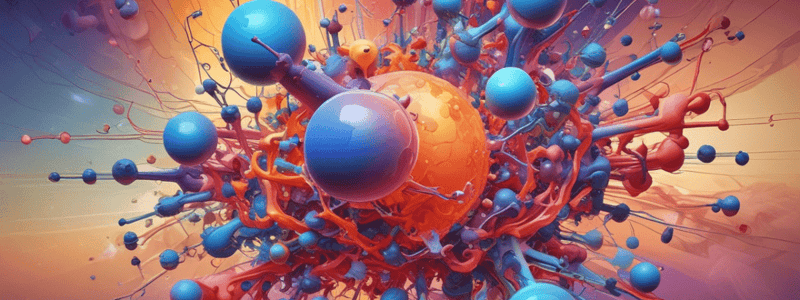Podcast
Questions and Answers
What is the fixed volume characteristic of?
What is the fixed volume characteristic of?
- All of the states of matter
- Solid
- Gas
- Liquid (correct)
What is the process of a solid becoming a gas without passing through the liquid state?
What is the process of a solid becoming a gas without passing through the liquid state?
- Condensation
- Evaporation
- Sublimation (correct)
- Deposition
What is the movement of particles from an area of high concentration to an area of low concentration?
What is the movement of particles from an area of high concentration to an area of low concentration?
- Brownian Motion
- Diffusion (correct)
- Evaporation
- Condensation
In what state of matter are particles closely packed in a fixed arrangement and can only vibrate in place?
In what state of matter are particles closely packed in a fixed arrangement and can only vibrate in place?
What is the process where a liquid becomes a solid?
What is the process where a liquid becomes a solid?
What is the random, erratic movement of particles suspended in a fluid?
What is the random, erratic movement of particles suspended in a fluid?
In what state of matter are particles far apart and move freely, filling the container?
In what state of matter are particles far apart and move freely, filling the container?
What is the process where a gas becomes a solid?
What is the process where a gas becomes a solid?
Which state of matter has a fixed shape and volume?
Which state of matter has a fixed shape and volume?
What is the term for the temperature at which a liquid becomes a gas?
What is the term for the temperature at which a liquid becomes a gas?
According to the kinetic molecular theory, what is the main difference between the particles in a solid and those in a liquid?
According to the kinetic molecular theory, what is the main difference between the particles in a solid and those in a liquid?
What is the process that occurs when a gas becomes a liquid, and a liquid becomes a solid, at the same temperature?
What is the process that occurs when a gas becomes a liquid, and a liquid becomes a solid, at the same temperature?
Why does a drop of food coloring spread in water?
Why does a drop of food coloring spread in water?
What is the term for the process where a solid becomes a liquid?
What is the term for the process where a solid becomes a liquid?
Which of the following is NOT a change of state?
Which of the following is NOT a change of state?
According to the kinetic molecular theory, what is the main difference between the particles in a liquid and those in a gas?
According to the kinetic molecular theory, what is the main difference between the particles in a liquid and those in a gas?
What is the primary factor that determines the change of state of a substance?
What is the primary factor that determines the change of state of a substance?
Which of the following states of matter has both a fixed shape and volume?
Which of the following states of matter has both a fixed shape and volume?
What is the term for the process where a liquid becomes a gas at a temperature below its boiling point?
What is the term for the process where a liquid becomes a gas at a temperature below its boiling point?
According to the kinetic molecular theory, what is the primary difference between particles in a solid and those in a gas?
According to the kinetic molecular theory, what is the primary difference between particles in a solid and those in a gas?
What is the term for the process where a solid becomes a liquid at a constant temperature?
What is the term for the process where a solid becomes a liquid at a constant temperature?
Which of the following is an example of diffusion?
Which of the following is an example of diffusion?
What is the term for the temperature at which a solid becomes a liquid?
What is the term for the temperature at which a solid becomes a liquid?
What is the primary reason why particles in a gas are able to move freely?
What is the primary reason why particles in a gas are able to move freely?
What is the primary reason why particles in a solid are closely packed in a fixed arrangement?
What is the primary reason why particles in a solid are closely packed in a fixed arrangement?
What is the primary difference between diffusion and Brownian motion?
What is the primary difference between diffusion and Brownian motion?
What is the primary factor that determines the change of state of a substance from a solid to a liquid?
What is the primary factor that determines the change of state of a substance from a solid to a liquid?
What is the primary reason why particles in a liquid are able to move past each other?
What is the primary reason why particles in a liquid are able to move past each other?
Which of the following processes involves the formation of bubbles?
Which of the following processes involves the formation of bubbles?
What is the primary difference between the kinetic molecular theory and the classical theory of gases?
What is the primary difference between the kinetic molecular theory and the classical theory of gases?
Which of the following statements is true about the kinetic molecular theory?
Which of the following statements is true about the kinetic molecular theory?




